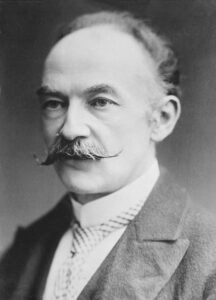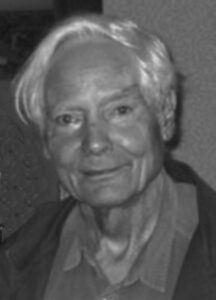I have a lovely but inexpensive set of novels by Thomas Hardy, whose poetry I’m familiar with but whose prose I’ve put off reading. I can’t say why I’ve put off that pleasure, but I’m in the process of correcting it now. The writing is rich, interweaving description and action and moving from heights to depths and back, at times in the same paragraph. But fifteen chapters in, I was unprepared for an idea whose origin I thought I knew: the idea that we all pass the anniversary of our death every year without knowing it. It’s an idea addressed by W. S. Merwin in his famous poem from the early 1960s, “For the Anniversary of My Death,” first collected in The Lice:
Every year without knowing it I have passed the day
When the last fires will wave to me
And the silence will set out
Tireless traveller
Like the beam of a lightless starThen I will no longer
Find myself in life as in a strange garment
Surprised at the earth
And the love of one woman
And the shamelessness of men
As today writing after three days of rain
Hearing the wren sing and the falling cease
And bowing not knowing to what
This is certainly among Merwin’s finest lyrics, but the idea turns out not to be as unique as I’d imagined. Here’s Hardy’s description of the young heroine of Tess of the D’Urbervilles, some months after the death of her illegitimate infant child:
She philosophically noted dates as they came past in the revolution of the year; the disastrous night of her undoing [Hardy’s euphemism for “seduction”]…; also the dates of the baby’s birth and death; also her own birthday; and every other day individualized by incidents in which she had taken some share. She suddenly thought one afternoon, when looking in the glass at her fairness, that there was yet another date, of greater importance to her than those; that of her own death, when all these charms would have disappeared; a day which lay sly and unseen among all the other days of the year, giving no sign or sound when she annually passed over it; but not the less surely there. When was it? Why did she not feel the chill of each yearly encounter with such a cold relation?
Did Merwin have Tess in mind? “The shamelessness of men,” one of the clear themes in the novel, makes me think—maybe so.



 Joseph Hutchison, Colorado Poet Laureate 2014-2019, has published 20 collections of poems and edited or co-edited three poetry anthologies. He currently directs two master’s-level programs for University College at the University of Denver: Professional Creative Writing and Arts & Culture Management. Joe lives with his wife, Melody Madonna, in the mountains southwest of Denver, Colorado, the city where he was born.
Joseph Hutchison, Colorado Poet Laureate 2014-2019, has published 20 collections of poems and edited or co-edited three poetry anthologies. He currently directs two master’s-level programs for University College at the University of Denver: Professional Creative Writing and Arts & Culture Management. Joe lives with his wife, Melody Madonna, in the mountains southwest of Denver, Colorado, the city where he was born. 










Love those Hardy quotes! He was a favorite of James Wright, in whose work you can feel the influence. And Bob, yes … I’ve started JUDE a couple of times but never gotten far. I read somewhere the opposite take on your grad school experience—that he thought it his best book and when the critics hated it he abandoned fiction.
There is also a Hardy poem with a somewhat similar idea embedded in it. “The Going” about the death of his first wife.
Never to bid good-bye
Or lip me the softest call,
Or utter a wish for a word, while I
Saw morning harden upon the wall,
Unmoved, unknowing
That your great going
Had place that moment, and altered all.
The phrase “saw morning harden upon the wall” will always astound me. Thanks for bringing this up.
Fascinating discovery. Thanks for sharing it! Merwin’s poem is in my personal binder of “favorite poems of all time.” I also have this one by Hardy:
Embarcation
Southampton Docks: October 1899
Here, where Vespasian’s legions struck the sands,
And Cendric with the Saxons entered in,
And Henry’s army lept afloat to win
Convincing triumphs over neighboring lands,
Vaster battalions press for further strands,
To argue in the selfsame bloody mode
Which this late age of thought, and pact, and code,
Still fails to mend.–Now deckward tramp the bands,
Yellow as autumn leaves, alive as spring;
And as each host draws out upon the sea
Beyond which lies the tragical To-be,
None dubious of the cause, none murmuring,
Wives, sisters, parents, wave white hands and smile,
As if they knew not that they weep the while.
– Thomas Hardy
An excellent post, as usual. Wait until you get to JUDE THE OBSCURE. Be in a good mood, because you’re going to need it. The grad school joke was that he wrote it to piss off everyone so he could concentrate just on his poetry.
I’ve got a slew of those little sticky flags to mark quotes with, and so far Tess is bristling with them! He also does something I never associated with writers of that period. He has a lovely scene of people from Tess’s village working in the fields. He opens the scene in the narrative past tense, the base tense of the novel; but when he focuses on Tess, he shifts to the present tense, then returns to the narrative past after foregrounding her. A modernist in 1891! Of course, my surprise may spring from ignorance.
Fine excerpt from Hardy, reminding me to add him to my rereading list. I also thought Merwin unique in that great poem of his, but surely he read Tess. It also reminds me of Vallejo’s famous poem. I may be paraphrasing: “I shall die in Paris, in the rain/on a day I already remember…”
Good one, thanks for reminding me of Tess.